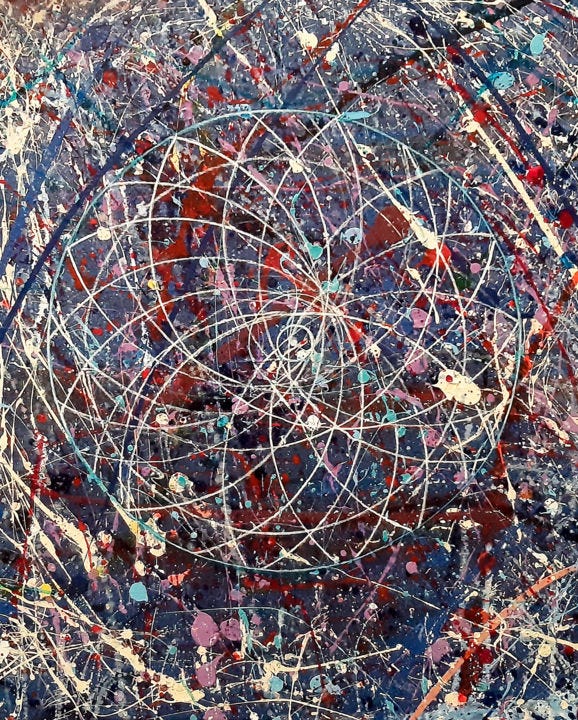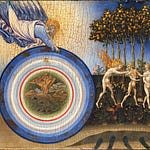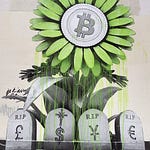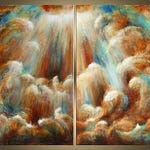*In this multi-part special edition of The Freedom Analects, we will be featuring the excellent written work of author John Vallis titled “Money Messiah: God, Bitcoin, and The Evolution of Consciousness.” This essay beautifully depicts the deeper aspects of value and money, their indispensability to human action, and demonstrates why corrupt money is such a destructive force. John’s original work is available in its entirety here.
Maps of Meaning*
*(continued from Part 2)
<Peterson’s> proposition, is that far from simple superstitious stories, pre-scientific attempts to explain natural phenomena, or even the account of actual events, the religious stories are (perhaps primarily) humanity’s attempts at conveying in the most powerful, the most meaningful way possible, the answers to the following questions:
Given the structure that has shaped us, and that serves as our ‘domain for action’, how should we act?
What is the optimal ‘mode of being’ for ‘success’ in this world?
What results when we act in a manner that is optimally congruent with the forces (seen and unseen) to which we are adapted?
The answer, and the focal point of these stories, is exemplified in the ‘regenerative’, ‘redemptive’ or ‘creative’ hero.
This is the character who has optimally mediated the forces of reality (chaos and order), and having done so, is a representation of the mode of being that best establishes ‘good and useful order’, or said another way, the ‘best possible outcome’.
The behaviour of this archetypal character is meant to be a representation of the best possible balancing of their individual interests, and those with whom their environment is shared. This character displays an unrivalled understanding of the form and functioning of the reality in which they exist, which may be why they are often said to have the greatest ‘knowledge of god’, be ‘the son of god’, or some variation thereof. Having accomplished this, the regenerative hero serves as an example, the embodiment of certain ideals or principles, for all others to emulate, toward the perpetual maximization of individual flourishing and social harmony.
*Join me at the biggest event of the year, Bitcoin 2022. See below for 10% discount on tickets*
“Bitcoin 2022 Conference is the biggest gathering of the Bitcoin ecosystem in the world. Join me and the movers and shakers shaping the Bitcoin future next April 6-9th in Miami Florida for Bitcoin 2022 Conference.”
Paying with Fiat? 10% Affiliate link: http://tixr.com/pr/robertbreedlove/26217
Paying with Bitcoin? Use promo code: BREEDLOVE.
Peterson:
“The hero organizes the demands of social being and the responsibilities of his own soul into a coherent, hierarchically arranged unit.”
As positive as this may sound, it is often the case that the regenerative hero is, at some point, demonized in one way or another. They are ridiculed, fought, or dismissed, because their behaviour, or the ‘new order’ they bring (or represent), is often first seen as being in opposition to the incumbent ‘established order’, and indeed it is.
The hero is seeking to instantiate an alternative ‘mode of being’, one which is grounded in a more coherent and high-fidelity perception of ‘what is’ — that is, one which is more truthful. As a result, the hero is often faced with resistance, as most people are not so ready to accept an alternative truth, an alternative set of parameters, an alternative set of possibilities, and an alternative set of responsibilities (from those they have become habituated and accustomed to).
Peterson:
“The revolutionary produces involuntary alteration in the ‘articles of faith’ of the normal individual. It is this capacity that makes him revolutionary and necessary — and feared and despised.”
It’s important not to interpret this dynamic as simply one pertaining to an individual’s relationship to ‘culture’.
Erich Neumann, in the book ‘The Origins and History of Consciousness’, delves deeply into how this dynamic also plays out within oneself. In particular, in the relationship between the unconscious and conscious mind, and how it’s best engaged or regulated to yield an optimally ‘integrated self’. In this case, the ‘established’ culture is representative of the current state of the ‘self’, and the ‘hero’ is a representation of the process and products of probing the depths — and dangers — of the unconscious, in order to bring back something which, though initially disruptive, is ultimately of great benefit in the pursuit of a more refined, or evolved, consciousness.
Neumann:
“The growth of individuality and its development are mankind’s answer to the ‘perils of the soul’ that threaten from within, and to the ‘perils of the world’ that threaten from without. Magic and religion, art, science, and technics are man’s creative efforts to cope with this threat on two fronts… At the centre of all these endeavours stands a creative individual as the hero, who in the name of the collective — even when he is a lonely figure standing out against it — moulds it into shape by moulding himself.”
The regenerative hero has gone by many names throughout the ages, in a wide variety of cultural narrative. One of these, is a/the ‘Messiah’; the one who embodies a new and better ‘ordering principle’ — a more refined instantiation of the principles which order our experience of reality — and who therefore is able to more optimally balance the forces of chaos and order, to ‘save’, ‘unite’ and ‘liberate’ humanity.
The ‘Messiah’ character is often used to signal, or represent, the emergence of a new way of engaging that reality — a new age — and the destruction or obsolescence of the old.
*Ledn has recently launched a Bitcoin-based home mortgage product. Now you can buy your dream home without selling your Bitcoin!
Sign up with Ledn to get started today: https://mortgage.ledn.io/
The most well-known example of such a character in the Western world, is Jesus.
Whether the historical character of Jesus Christ existed or not, the articulation of the manner in which his existence was constituted (his behavioural narrative), is what is most instructive. Jesus was the representation of someone who embodied the ‘principles of god’ (or the structure of reality, if you like) in the most high-resolution manner yet to be articulated (in a certain part of the world at least), and who’s actions therefore were most representative of the optimal mode of being. He was the instantiation of a more refined perception of the ‘truth’, and the story of his life is a symbolic representation of what kind of behaviour such a perception elicits.
As Peterson explains, the character of Christ was not necessarily an example of ‘how to behave’, but ‘how can (or is or was) how to behave be determined?’.
He goes on to explain why such figures are important:
“To what end are all behaviours (and representations of those behaviours) archetypally subjugated? Toward establishment of a state — a spiritual kingdom — that allows the behavioural processes that transform and establish morality to flourish.”
However, Christ as ‘process for discovering, integrating and expressing the truth of god/reality (I will use these interchangeably throughout this piece)’, has seemingly, for some, given way to ‘dogmatic prescription for behaviour’.
Peterson:
“In consequence, the ‘imitation of Christ’ — or the central culture-hero of other religious systems — tends to take the form of ritualistic worship, separated from other ‘nonreligious’ aspects of life. Voluntary participation in the heroic process, by contrast — which means courageous confrontation with the unknown — makes ‘worship’ a matter of true identification. This means that the true ‘believer’ rises above dogmatic adherence to realize the soul of the hero — to ‘incarnate that soul’ — in every aspect of his day to day life.”
The regenerative hero, then, is meant to represent the principle and process by which truth is to be discovered and engaged, such that a closer relationship to reality may be established, and a better world (one made manifest by that truth) may emerge through, and because of, each individual.
Peterson:
“The significance of the Christian passion is the transformation of the process by which the goal is to be attained, into the goal itself: the making of the ‘imitation of Christ’ — the duty of every Christian citizen — into the embodiment of courageous, truthful, individually unique existence.”
If this subject is of interest to you, I strongly suggest a reading of Maps of Meaning.
In Part 4, John explains the role served by the concept of God within hierarchies of value…
Thank you for reading Money Messiah (Part 3).
PODCAST
SOCIAL
SUPPORT
Send Bitcoin to my PayNymID: +tightking693
RECOMMENDED BUSINESSES
Automatically buy and withdraw Bitcoin ($10 in free Bitcoin here)
Join Me at the Bitcoin 2022 Conference in Miami, FL (Code: BREEDLOVE)
Home Delivered Organic Grass-Fed Beef (Discount Code: BREEDLOVE22)
Bitcoin-based home mortgages with Ledn: A better home for your Bitcoin
If you’ve found my work to be valuable, please join our private telegram group:


















Money Messiah (Part 3)